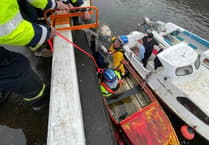How would we spot someone like Dr Shipman, what do we know of the psychology of a mass murderer?' was one of the many fascinating questions Claud Regnard was asked after his talks 'Assisted Dying - the Facts, the Evidence' in Douglas and Ramsey on May 16 and 17.
There were many parts of his presentations that came as a surprise to me.
Did you know, for example, that in no jurisdiction where assisted dying is legal is the process leading to death subject to any form of legal review, before the person is dead?
Or that records of deaths by assisted dying in Oregon are shredded after just one year, making later research impossible?
In fact. it seems there is a massive gap in data and evidence from these countries, with huge holes in record keeping. In Belgium nearly half of assisted deaths are never reported, partly so that doctors can avoid the paperwork associated with euthanasia. And nowhere has approved or researched the use of any drugs for this purpose.
It is natural that we all are concerned what our future might hold, as Woody Allen famously remarked: 'I'm not afraid of death; I just don't want to be there when it happens.'
And we hear some frightening stories of suffering to add fuel to that fire; so it was also interesting to see figures showing that natural death and assisted dying deaths actually had the same level of peacefulness.
As a palliative care medical consultant with many years of experience in Oxford and St Oswald's Hospice, Newcastle, Dr Regnard strove to correct many of the outdated views on poor symptom control for the dying.
But he did show that access to good palliative care across the British Isles is still very patchy indeed, and commented on the better position we have here on the Island with our excellent hospice.
Well at least the easy availability of assisted dying would reduce non-assisted suicide rates, won't it?
That would seem obvious, but no - sadly non-assisted suicides have not dropped in assisted dying jurisdictions.
So it won't be the solution to that problem, which was debated at length in Tynwald last week. And where could you draw the line between assisted suicide and suicide prevention?
One point hammered home by Dr Regnard was that assisted dying must never be part of health care. In countries with assisted dying, 98-99% of doctors will take no part in it.
So what about the ones that do?
Most report finding it emotionally traumatic.
But then we come back to that Shipman question.
Dr Regnard's talk
Some of the individual Canadian doctors euthanising people in Canada have already done more than 400 cases.
Nurses can do it there as well.
Whilst doctors and nurses are very poor at spotting depression or coercion by relatives, how about the reverse?
Subtle manipulation by doctors or nurses to get people to accept an assisted suicide? S
So what was the answer to the Shipman question?
Like so much around assisted dying, it seems we simply don't know.
Graham McAll
Retired GP/surgeon
Gordon
Peel
This letter was first published in the Manx Independent of May 25.
Share your views with our readers.
Write to: Opinions, Isle of Man Examiner and Manx Independent, 18 Finch Road, Douglas, IM1 2PT or email:
Don’t forget to include your name, FULL home address and a daytime phone number even if you want to be anonymous in print.
Obviously, we need to be able to verify the identity of everyone whose letter we publish.
We don’t print phone numbers or full addresses and respect anonymity if the author requests it.




